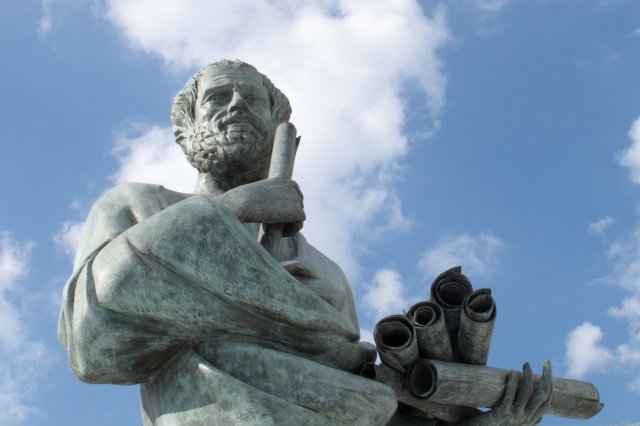
Though Aristotle wrote about politics over 2,300 years ago, he nonetheless remains required reading for anyone who wants to understand our populist moment.
He taught that politics is not ultimately about safety or comfort, although he accepted that both are important. Instead, the true aim of politics is to increase happiness and to promote friendship. A government, in his view, did that well if it used laws to inculcate good habits in its citizens, so that they lived good lives in the company of people to whom they were tied by more than simple blood-kinship.
Unlike his teacher, Plato, Aristotle believed this good life could only be lived in what we would nowadays call a republican form of government. While Plato argued, in The Republic, for the rule of an enlightened philosopher-king, Aristotle contended that people should be both ruler and ruled in turn. Finding the right ruler means engaging in debate, which in turn requires treating each other as being equal in the most decisive respect. There are many differences between our liberal democracies and Aristotle’s ideal regime, but one can easily see the common threads that link the two across the millennia.
Failure to engage with others as equals breeds revolution. Aristotle discusses this at length in Book Five of his Politics, and we would recognise many of the causes of revolution that he describes. Insolence, contempt, and the rapid introduction of strangers who “do not acquire at once a common spirit” all are things he cites as causing states to convulse and collapse. All those factors are present and visible in the populist movements of today.
Practitioners of identity politics on the Left and of doctrinaire libertarianism on the Right engage in insolent behaviour and display contempt for many of their fellow citizens, needlessly creating discord, strife, and conflict. Their inflexible and intolerant demands have created today’s populist backlash, which is nothing more than a cry that average, native-born citizens are people too.
Proponents of identity politics implicitly deny the possibility of reasonable discussion that can be conducted in a friendly, or at least civil, manner by all in society. They replace that with the idea that one’s lived experience is irretrievably shaped by race, gender, or innate orientation. If that is true, then political discussion is meaningless, because no group can truly understand an other – they are isolated from one another by the islands of their unique experiences. That is why we hear the epithets of racist, bigot, and sexist thrown about so wantonly – even to question the political demands of a group that feels powerless is illegitimate.
Proponents of doctrinaire libertarianism share the same principle, although they express it in a different way. The heart of their view is that no one has the right to interfere in a contract that two other people form. That can be true only if there is no common humanity or standard of judgment that people outside the contract – that is, you, me, and everyone else in society – can use to critique it. It’s not that other people are wrong; it’s that they have no standing to make an argument in the first place.
Doctrinaire libertarianism is generally out of favour, but it has become the common wisdom in the arenas of trade and migration. Free trade is often justified on utilitarian grounds – particularly in the assertion that it will make everyone better off – but when that is questioned, the vehemence of the response shows that the true justification is something else. Migration is often justified on humanitarian grounds, but again the vehemence of the response to people who question the need for it exposes the true motive. For the true-believing free-trader or libertarian, it’s simply a right for people to be able to trade with whom they want and to live where they want. There’s no objective standard that people who don’t like the results can invoke to change those policies.
The result of these beliefs is that people are told they must suffer – lose status, income, jobs, or something else – as a result of identity politics and libertarianism alike, and that they have no legitimate recourse. In effect, they are being kicked out of the political arena and deprived of their common citizenship. To use Aristotle’s terms, they are being treated with insolence and contempt. No wonder they are in revolt!
Traditionalist Christians, less-educated native-born citizens, and others caught up in populist movements want to be heard. Healthy societies would engage them in debate and seek to find common ground, so that all citizens can live together in harmony. That requires civility and respect, even in the face of intense disagreement about public policy. But to do that, one must first believe that we hold something important in common with those with whom we disagree.
Recovering Aristotle’s sense of politics and human nature would do that, and thus go a long way towards calming our turbulent political waters.










Join the discussion
Join like minded readers that support our journalism by becoming a paid subscriber
To join the discussion in the comments, become a paid subscriber.
Join like minded readers that support our journalism, read unlimited articles and enjoy other subscriber-only benefits.
Subscribe